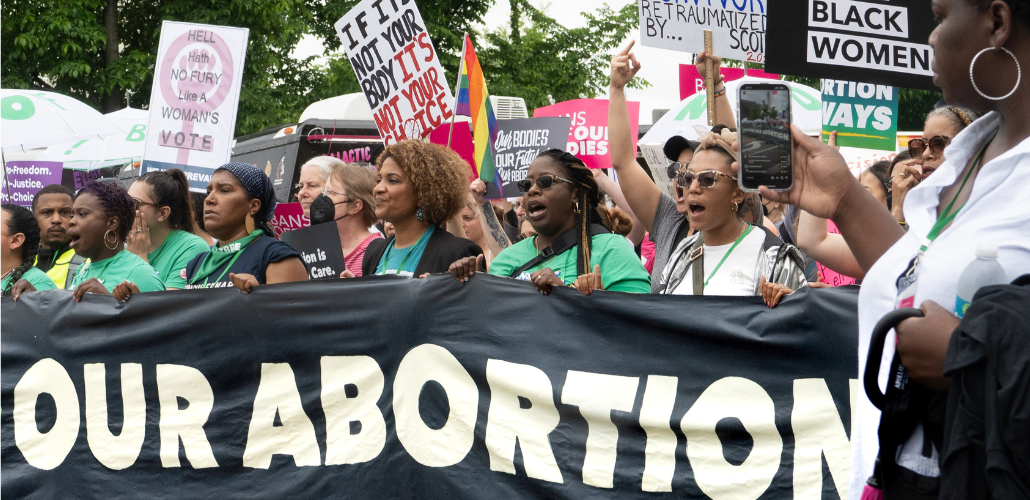Yes, Abortion Rights Are a Union Issue

Forced pregnancy will absolutely harm workers at work. Photo: Victoria Pickering (CC BY-NC-ND 2.0)
Abortion: it’s a topic unions shy away from. The logic is, why go there? You might alienate conservative workers who otherwise share your workplace concerns.
And it’s true, you might—though the issue is not as divisive as the GOP makes it out to be. A solid 61 percent of U.S. adults is pro-choice. Among those aged 18-29, it’s 74 percent.
It’s good to see unions begin to overcome this fear and take a stand—because, contrary to the narrative, abortion is a labor issue.
ON-THE-JOB IMPACTS
How so? For one thing, workers who get pregnant are penalized at work.
Pregnancy discrimination is very real. Many jobs make it tough to get light duty or accommodations. And parenthood brings the “mommy tax”—a lifetime loss of income for women who have children, thanks to stingy parental leave and unaffordable childcare.
Missed opportunities, resume gaps, reduced work hours—all these impinge on women’s equality at work, not to mention their union participation.
Labor must fight to change all that; even a wanted parenthood shouldn’t carry such steep penalties. But the current reality is that forced pregnancy will absolutely harm workers at work.
COLLECTIVE MUSCLE
Then there are members’ needs beyond the workplace. As Stacy Davis Gates reminded us in her talk at this year’s Labor Notes Conference, workers are not just workers—we are mothers, daughters, tenants, immigrants, and more.
Unions fight for our dignity and autonomy on the job, but those human needs don’t end when we clock out. Members need abortions; their friends, family, and neighbors need them too. About 1 in 4 women eventually gets one.
Unions at their best are a uniquely powerful fighting force for the whole working class. They’re organized, they have budgets and knowhow, and they have the leverage that can win big—the power to strike, a power that can take down governments and transform society.

SUPPORT LABOR NOTES
BECOME A MONTHLY DONOR
Give $10 a month or more and get our "Fight the Boss, Build the Union" T-shirt.
Our sisters and siblings (trans people also get pregnant!) need us in this fight, not just as individuals, but as organized labor.
COMMON ENEMIES
The villains attacking our right to abortion care should look familiar to workplace activists, too—they’re the same ones pushing to lower our wages, weaken our unions, and speed up our work.
Even many of the corporations that leaped to announce new abortion travel benefits for employees were soon revealed as donors to the very groups that had pushed Dobbs v. Jackson to the Supreme Court—groups like the Republican Attorney Generals Association, the Federalist Society, and the American Legislative Exchange Council.
Most employers aren’t in it for the abortion restrictions; their goal is deregulation and union-busting. But the effect is the same.
THE RIGHT TO MOM
There’s another side to the coin. Unions are also needed in the fight for the right to have children when we do want them.
A more expansive term than abortion rights is “reproductive justice.” The grassroots group SisterSong defines it as “the human right to maintain personal bodily autonomy, have children, not have children, and parent the children we have in safe and sustainable communities.”
Unions can bargain for the things working parents need—like equitable wages, paid parental leave, and childcare benefits. The transit union in Portland, Oregon, just won a “lactation van”; when a bus driver needs to pump breastmilk, the van comes to meet her.
We can also fight for a stronger safety net that offers all parents and kids the resources they need—like Medicaid, welfare, food assistance, childcare, and affordable housing.
SisterSong’s vision evokes many labor demands past and present: the right to a living wage, to health and safety on the job, to gender-affirming health care benefits. At their core, the labor and reproductive rights movements are both fighting for the same thing: the right to control our own lives.
Read more: What Can Unions Do Now to Defend Abortion Rights?







